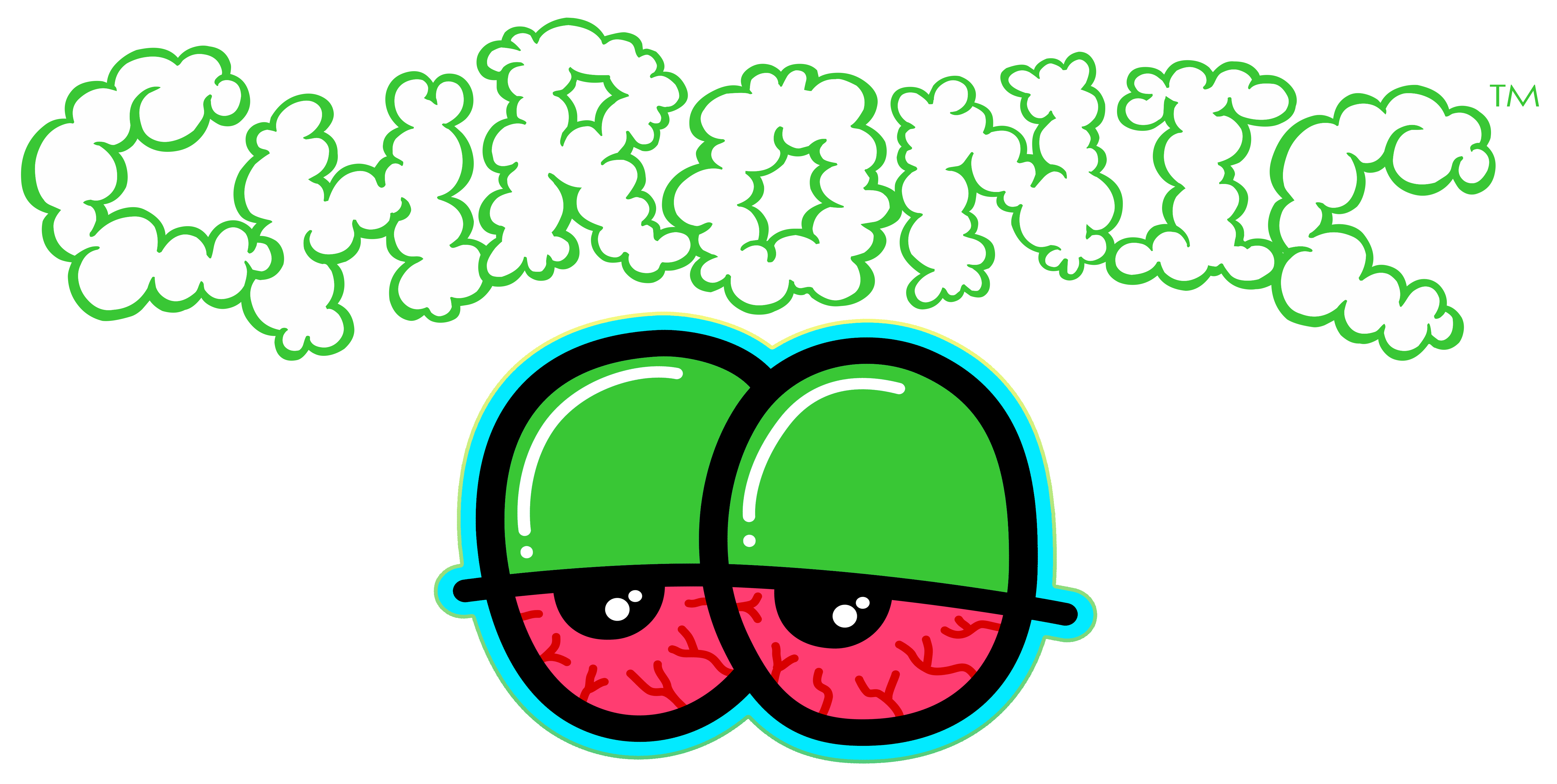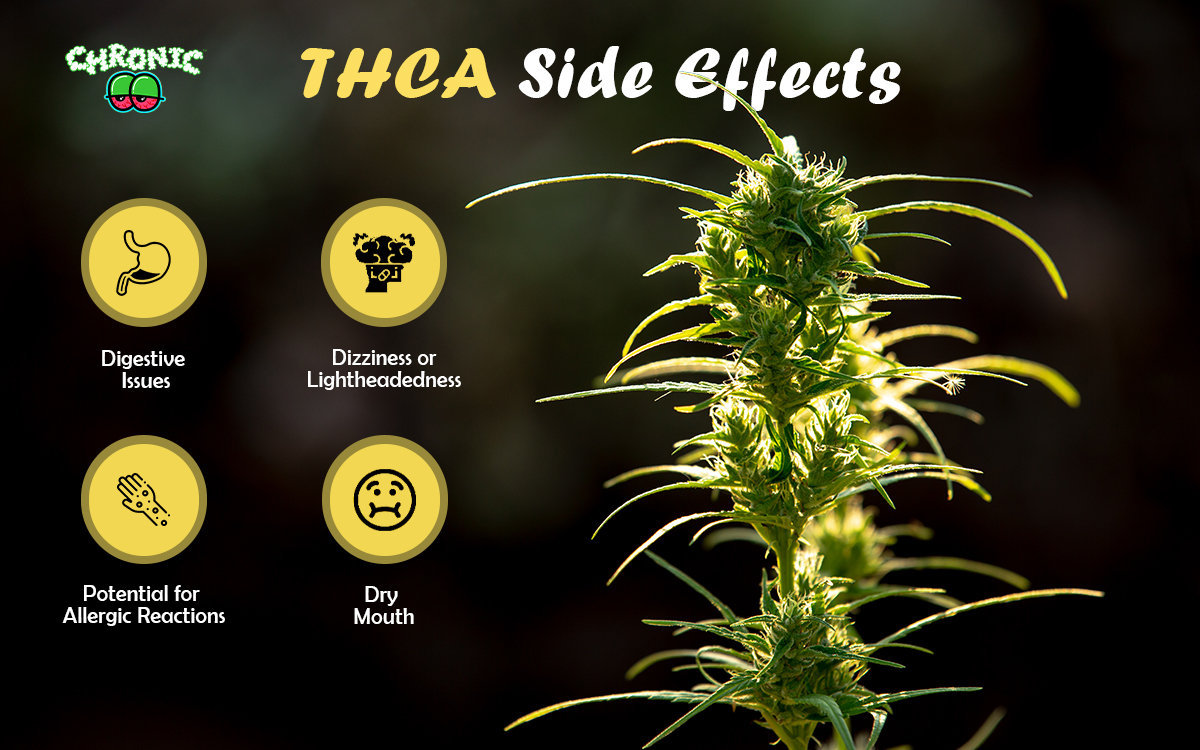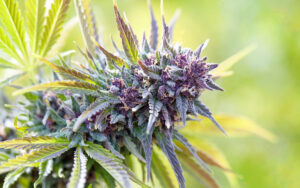Before learning about THCA Side Effects you need to know what THCA is first, THCA which is an abbreviation for Tetrahydrocannabinol acid, is a chemical found in cannabis which is non-psychoactive.
Furthermore, as opposed to THC (Tetrahydrocannabinol), which causes a high by binding to the brain’s receptor cells, THCA is not capable of causing a high sensation because it fails to attach itself effectively to the CB1 (‘cannabinoid’) receptors in the brain.
To put it differently, when exposed to heat, THCA decomposes into THC because it is a process similar to decarboxylation, as occurs when cannabis is burnt or vaporized or pre-rolled in a joint.
There is some preliminary evidence gathered to support the proposition that THCA may possess certain benefits of a therapeutic nature in its raw form such as anti-inflammatory, anti-nausea, neuroprotective, and anti-proliferative effects yet, further investigation is warranted for substantiation of these effects.
Long term THCA Side Effects
As opposed to THC, THCA is non-psychoactive until it undergoes decarboxylation (e.g. heating), therefore turning into psychoactive component THC. THCA is used primarily for its believed anti-inflammatory, neuroprotective, and antiemetic properties.
On the other hand regarding its side effects, Chronic poisoning with THCA may also affect the liver, organ infliction being more marked in cases of pre-existing liver illnesses, in use of liver metabolized substances and among breastfeeding women. There is evidence from several studies that the administration of cannabinoids is associated with immunosuppressive capabilities, it being assumed that the given effects would be exerted culminating in prolonged therapy of particular responses.
In addition, nonstop THCA use may also modify the signaling of the endocannabinoid system such changes would be expected to affect mood regulation, appetite, and sleep in the long term.
Consider Reading: THCA Benefits: What does THCA do? Usage, and Consumption
In addition, THCA exhibits no narcotic-like characteristics comparative to THC, however, habitual consumers who smoke it may, with time and sustained use, develop some tolerance. Also, this could happen in the user due to wanting to take more and more stinging, or different, contaminates due to the effects of the latter over time becoming less potent.
When using THCA, as is often the case, the entire plant cannabis extracts are used which results in the adverse effects of the compound in conjunction with other cannabinoids and terpenes in the extracts.More research is required on these possible adverse effects on human subjects.
Negative Side Effects of THCA
Tetrahydrocannabinol Acid (THCA) is a substance classified as a cannabinoid that does not get users high and present in raw vegetation of cannabis plants usually converts to THC by way of heat (that is known as decarboxylation).
On the other hand, THCA is normally believed to be helpful and beneficial to one’s health; however, it also has certain negative health consequences and risks, particularly during the long term or overuse. The tendency towards digestive issues or the occurrence of THCA induced stomach upset amongst others is one such common concern of THCA use similar to other Cannabinoids.
A subset of users exhibits symptoms of queasiness and gastrointestinal discomfort, which can be linked to the substances or constituents other than the drug in question itself – the cannabis plant in its entirety. Unlike cannabis and its derivatives, THCA particularly in high amounts can lead to alteration of liver enzymes, hence bringing about damage of the liver after a period of time, especially where it is taken with certain drugs.

Furthermore, given its classification as a bioactive component, it is conceivable that THCA may result in a drug-drug interaction and cause any adverse effects or even inactivate the therapeutics. Those who are presently suffering from any such conditions ought to be especially careful because of that property; THCA might in certain cases be immunosuppressant.
Moreover, THCA is not psychoactive but when THCA is converted to THC in the body this leads to some psychoactive effects, although these are mild others ingestion of large doses or within a product that may have small trace amounts of THC. Lastly, the usage of THCA has an issue of concern pertaining to regulations.
Countries differ in depositories or geographical regions as far as cannabis is concerned, possessing or using THCA can pose problems subject to the rules of a state. Bearing such possible adverse effects in mind, consulting a healthcare provider is strongly advised before trying THCA for anyone, particularly for those who have some medical conditions or take other drugs.
Side effects of THCA flower
Generally, the raw form of THCA, for example, in the fresh cannabis or unburnt flower is consumed with a variety of therapeutic benefits but a low level of psychoactive.
Nevertheless, it is, however, a psychoactive substance. The abuse of THCA flower, however, has a few adverse effects. This article outlines those side effects below.
Psychoactivity Side Effects
- Dry Mouth and Eyes:
Like many cannabinoids, THCA can lead to dehydration, which may cause dry mouth (revealing its commonly used name ‘cottonmouth’) as well as dry eyes.
- Dizziness or Lightheadedness:
Dizziness may occur in some persons, even though it is not a commonly reported side effect; especially if a person takes too much THCA or has a low tolerance to cannabinoids.
- Fatigue or Drowsiness:
A person may experience a level of relaxation and subdued energy when they take THCA; this effect may be productive at night for aiding sleep but may prove a nuisance during the day.
Sides Effects Which Raise A Less Common Risk
- Disturb stomach:
If one chews the cannabis raw flower, at times it can more or less disturb digestion and one may feel nauseous or have stomach cramps.
Allergic reactions: Very few users might exhibit very minimal allergic reactions like light rash, excessive itchiness or respiratory challenges.
- Interaction with medical therapy:
It has potential to react with some medical prescriptions and in most cases blood thinning agents or those agents that are liver metabolism incorporating changes in the action of the respective medicine.
THCA Diamonds Side Effects
THCA (tetrahydrocannabinol acid) diamonds are a form of cannabis concentrates which are quite popular due to their high purity and extreme potency. And although they are psychoactive only when heated, one cannot ignore the possible adverse effects of THCA diamond, particularly during decarboxylation .
- Psychoactive Effects: Heating treatment THCA will modify it into THC. It results in nice highs like elation, muddled sense of realities, and enhanced sight. This may be too overwhelming, especially for infrequent cannabis users.
- Drowsiness and Fatigue: A good number of smokers even experience drowsiness or sleepiness after intake of THC which may hinder normal activities and output.
- Increased Anxiety or Paranoia: An increase in levels of THC also tends to worsen the anxiety state or lead to paranoia as it does to many cannabis-sensitive people.
- Dry Mouth and Red Eyes: These side effects of THC are considered as normal and may range between mild and moderately troubling which are normally fairly controlled.
- Increased heart rate: The consumption of THC results in higher heart rates especially in those with certain cardiovascular problems which can sometimes pose a risk.
- Cognitive Impairment: Engaging in such activities is very dangerous as THC severely affects memory and concentration which are both critical elements in operating vehicles and other machines.
Like other cannabis-derived products, it is recommended to begin taking them at very small amounts so as to understand one’s tolerance limits and avoid adverse effects if any. In advance of taking this product health issues should be cleared preferably with a doctor in case the patient is in a serious health condition.
Side effects of THCA gummies
For those who may be confused, THCA is a cannabinoid and as you can guess, has numbing effects, however, instead of enjoying the high, most people prefer to use THCA infused products like gummies and puff able to relax.
In order to modify the active components THC and THCA present in fuel compounds, heating of the cannabis plant is most often performed as a decarboxylation process.
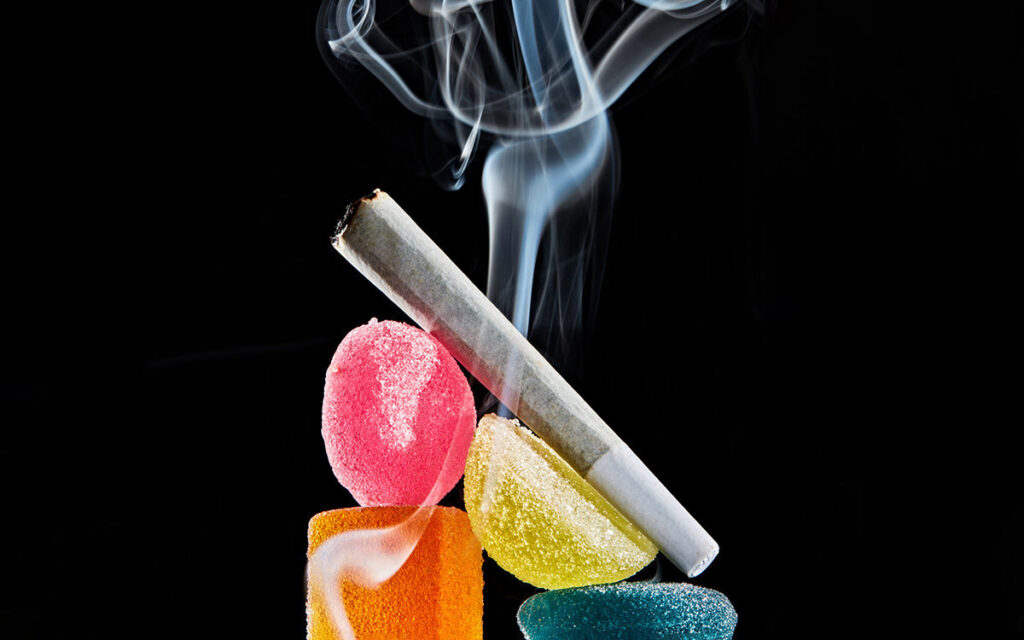
In most cases, THCA gummies which are taken in inactive shape are well tolerated and reported to have some health maintaining properties, for instance, anti-inflammatory, antiemetic and neuroprotective actions. However, this is not to say that some adverse effects cannot be experienced.
Common Effects That May Be Experienced
Though THCA as a compound does not create any psychoactive effects like that of THC inducing a ‘high’ feeling, there are some mild effects that might be experienced by people like dryness of the mouth, gastrointestinal discomfort in the form of nausea, or an upset stomach. Since THCA has a different metabolic path, these effects are commonly milder than those of THC.
- Digestive and Appetite problems
For some individuals, tolerance has been reported as a significant reduction in appetite or some soft issues such as minimal tooling around, especially of a bloated stomach or diarrhea. These effects are worse in those who are sensitive or after taking high doses.
- Allergic Reactions
Allergic reactions to THCA, though not common, pose risks. Some of the signs are itchiness, a rash, or slight swelling. An individual who is known to be allergic to cannabis or similar plant compounds should consult a physician before using THCA containing products
- Drug Interactions
THCA is able to alter the effect of the drugs especially those that alter the cytochrome P450 (CYP) liver enzymes. These interactions can potentiate or diminish the effects of the drug; hence it is suggested that a doctor be consulted.
To conclude, THCA gummies cause fewer side effects when compared to products containing THC, however, slight gastrointestinal upset, loss of appetite, and infrequent allergic reactions may be experienced.
Side effects of THCA in elderly
Conversely, the demographic that is comparatively older and may wish to use THCA may often encounter side effect concerns that are more accentuated in them but may differ completely in younger age groups as such concerns are likely to be affected by certain age-related issues.
Utilizing THCA, some elderly patients experience adverse events, including but not limited to, dizziness, sedation, gastrointestinal problems such as nausea, and loss of appetite. Others may exhibit symptoms of irritability, dry mouth or slight drowsiness.
Being non-psychoactive, the chemical does not give the euphoric sensation termed as the ‘high’ produced by THC; it however has the potency to bind to the endocannabinoid receptors in the body hence causing a change in mood and cognition which may lead to clear-headedness where the senior’s in particular are mentally alert but tend to act confused whereby they may not know where they are which is relevant to their previous mental state.
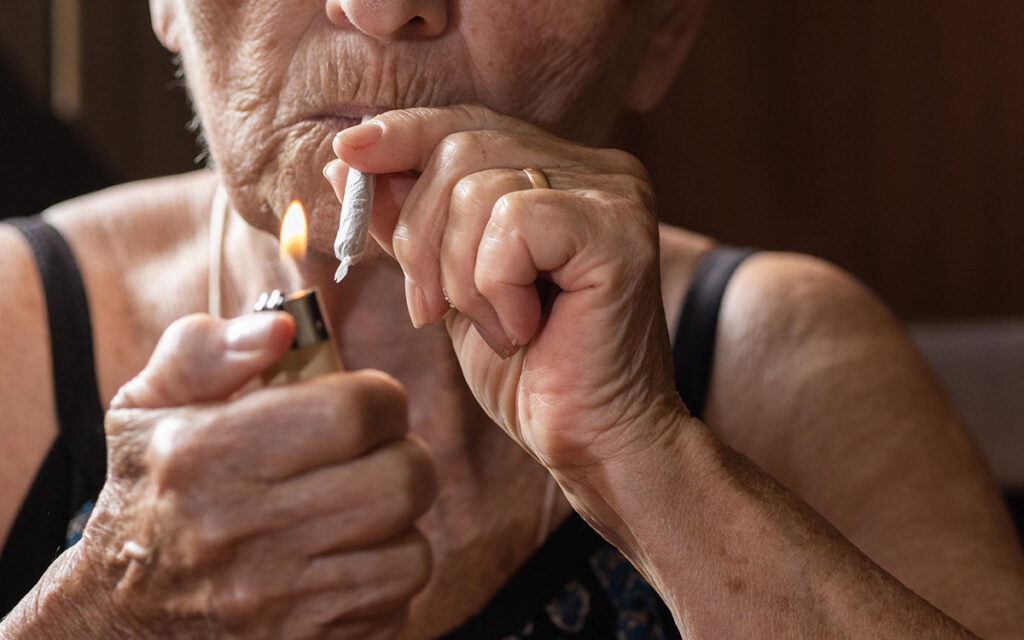
This is important because inhibition of those enzymes can lead to THCA interacting with treatments usually prescribed for other illnesses in the older population, such as drugs for blood thickeners or depression or sleepiness inducing drugs, which potentially increases the chances of more unpleasant side effects like surplus bleeding or tiredness owing to increased sedative effect.
Response to treatment is different from patient to patient and therefore the treatment of these patients should be carefully supervised to the extent of attending to the dosage taken. The effects of long term treatment with THCA in patients especially over the age of 65 have not been extensively studied.
Until more research clarifies these effects, caution is advisable especially for the older people suffering from chronic diseases as well as taking a number of drugs.
